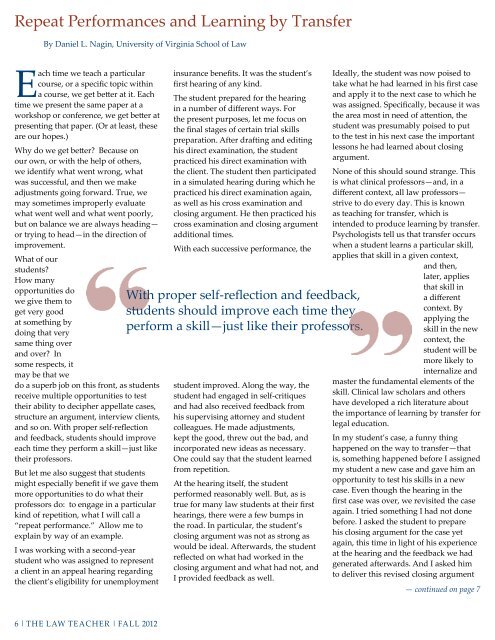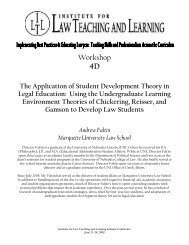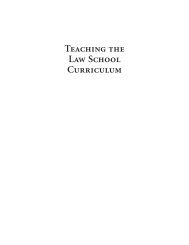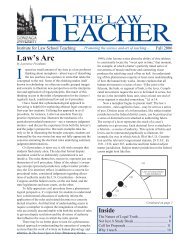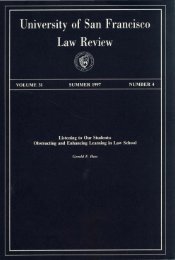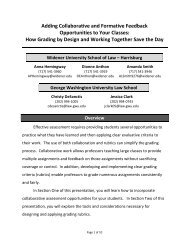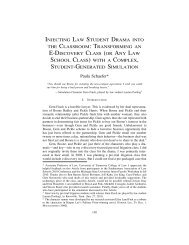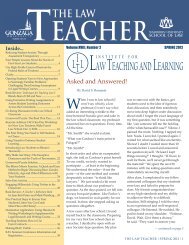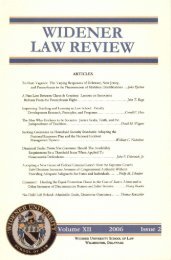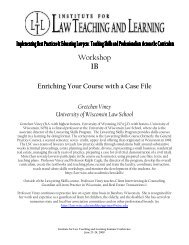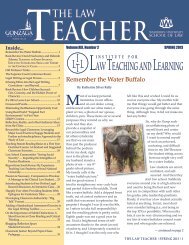The Law Teacher - Institute for Law Teaching and Learning
The Law Teacher - Institute for Law Teaching and Learning
The Law Teacher - Institute for Law Teaching and Learning
You also want an ePaper? Increase the reach of your titles
YUMPU automatically turns print PDFs into web optimized ePapers that Google loves.
epeat Per<strong>for</strong>mances <strong>and</strong> <strong>Learning</strong> by Transfer<br />
By Daniel L. Nagin, University of Virginia School of <strong>Law</strong><br />
each time we teach a particular<br />
course, or a specific topic within<br />
a course, we get better at it. Each<br />
time we present the same paper at a<br />
workshop or conference, we get better at<br />
presenting that paper. (Or at least, these<br />
are our hopes.)<br />
Why do we get better? Because on<br />
our own, or with the help of others,<br />
we identify what went wrong, what<br />
was successful, <strong>and</strong> then we make<br />
adjustments going <strong>for</strong>ward. True, we<br />
may sometimes improperly evaluate<br />
what went well <strong>and</strong> what went poorly,<br />
but on balance we are always heading—<br />
or trying to head—in the direction of<br />
improvement.<br />
what of our<br />
students?<br />
how many<br />
opportunities do<br />
we give them to<br />
get very good<br />
at something by<br />
doing that very<br />
same thing over<br />
<strong>and</strong> over? In<br />
some respects, it<br />
may be that we<br />
do a superb job on this front, as students<br />
receive multiple opportunities to test<br />
their ability to decipher appellate cases,<br />
structure an argument, interview clients,<br />
<strong>and</strong> so on. With proper self-reflection<br />
<strong>and</strong> feedback, students should improve<br />
each time they per<strong>for</strong>m a skill—just like<br />
their professors.<br />
But let me also suggest that students<br />
might especially benefit if we gave them<br />
more opportunities to do what their<br />
professors do: to engage in a particular<br />
kind of repetition, what I will call a<br />
“repeat per<strong>for</strong>mance.” allow me to<br />
explain by way of an example.<br />
I was working with a second-year<br />
student who was assigned to represent<br />
a client in an appeal hearing regarding<br />
the client’s eligibility <strong>for</strong> unemployment<br />
6 | <strong>The</strong> <strong>Law</strong> <strong>Teacher</strong> | FaLL 2012<br />
insurance benefits. It was the student’s<br />
first hearing of any kind.<br />
<strong>The</strong> student prepared <strong>for</strong> the hearing<br />
in a number of different ways. For<br />
the present purposes, let me focus on<br />
the final stages of certain trial skills<br />
preparation. after drafting <strong>and</strong> editing<br />
his direct examination, the student<br />
practiced his direct examination with<br />
the client. <strong>The</strong> student then participated<br />
in a simulated hearing during which he<br />
practiced his direct examination again,<br />
as well as his cross examination <strong>and</strong><br />
closing argument. he then practiced his<br />
cross examination <strong>and</strong> closing argument<br />
additional times.<br />
with each successive per<strong>for</strong>mance, the<br />
With proper self-reflection <strong>and</strong> feedback,<br />
students should improve each time they<br />
per<strong>for</strong>m a skill—just like their professors.<br />
student improved. along the way, the<br />
student had engaged in self-critiques<br />
<strong>and</strong> had also received feedback from<br />
his supervising attorney <strong>and</strong> student<br />
colleagues. he made adjustments,<br />
kept the good, threw out the bad, <strong>and</strong><br />
incorporated new ideas as necessary.<br />
One could say that the student learned<br />
from repetition.<br />
at the hearing itself, the student<br />
per<strong>for</strong>med reasonably well. But, as is<br />
true <strong>for</strong> many law students at their first<br />
hearings, there were a few bumps in<br />
the road. In particular, the student’s<br />
closing argument was not as strong as<br />
would be ideal. afterwards, the student<br />
reflected on what had worked in the<br />
closing argument <strong>and</strong> what had not, <strong>and</strong><br />
I provided feedback as well.<br />
Ideally, the student was now poised to<br />
take what he had learned in his first case<br />
<strong>and</strong> apply it to the next case to which he<br />
was assigned. Specifically, because it was<br />
the area most in need of attention, the<br />
student was presumably poised to put<br />
to the test in his next case the important<br />
lessons he had learned about closing<br />
argument.<br />
None of this should sound strange. This<br />
is what clinical professors—<strong>and</strong>, in a<br />
different context, all law professors—<br />
strive to do every day. This is known<br />
as teaching <strong>for</strong> transfer, which is<br />
intended to produce learning by transfer.<br />
Psychologists tell us that transfer occurs<br />
when a student learns a particular skill,<br />
applies that skill in a given context,<br />
<strong>and</strong> then,<br />
later, applies<br />
that skill in<br />
a different<br />
context. By<br />
applying the<br />
skill in the new<br />
context, the<br />
student will be<br />
more likely to<br />
internalize <strong>and</strong><br />
master the fundamental elements of the<br />
skill. clinical law scholars <strong>and</strong> others<br />
have developed a rich literature about<br />
the importance of learning by transfer <strong>for</strong><br />
legal education.<br />
In my student’s case, a funny thing<br />
happened on the way to transfer—that<br />
is, something happened be<strong>for</strong>e I assigned<br />
my student a new case <strong>and</strong> gave him an<br />
opportunity to test his skills in a new<br />
case. even though the hearing in the<br />
first case was over, we revisited the case<br />
again. I tried something I had not done<br />
be<strong>for</strong>e. I asked the student to prepare<br />
his closing argument <strong>for</strong> the case yet<br />
again, this time in light of his experience<br />
at the hearing <strong>and</strong> the feedback we had<br />
generated afterwards. <strong>and</strong> I asked him<br />
to deliver this revised closing argument<br />
— continued on page 7


